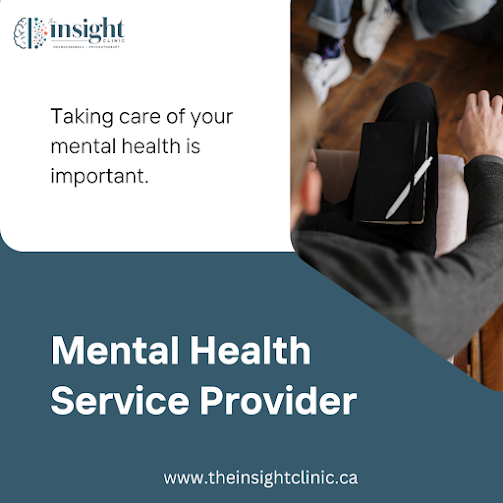Direct Neurofeedback Therapy and Psychiatrist Medication: A Balanced Approach to Mental Health
Mental health treatment has come a long way in the past few decades. From talk therapy and psychiatrist-prescribed medications to innovative brain-based therapies, individuals now have access to a wide range of options designed to improve mental well-being. At The Insight Clinic, we recognize that every person’s mental health journey is unique. That’s why we provide both Direct Neurofeedback Therapy and psychiatrist medication options, giving clients the best of both worlds in personalized care.
In this blog, we’ll explore what these approaches mean, how they differ, and why combining them often leads to the most effective outcomes.
Understanding Direct Neurofeedback Therapy
Direct Neurofeedback Therapy is a modern, non-invasive treatment that uses advanced technology to help the brain “reset” and regulate itself. Unlike traditional neurofeedback, which trains the brain through repeated feedback loops, direct neurofeedback provides a subtle electrical signal that temporarily interrupts unhealthy brainwave patterns.
This interruption allows the brain to reorganize itself into healthier functioning patterns, which can reduce symptoms such as anxiety, depression, PTSD, insomnia, ADHD, and more. Many clients describe it as a gentle “nudge” for the brain—helping it find its natural balance without force or discomfort.
How It Works:
Small electrodes are placed on the scalp to measure brain activity.
A computer delivers a micro-signal to the brain—so small it can’t be felt.
This signal helps interrupt stuck or dysregulated brainwave patterns.
Over time, the brain learns to reset itself more consistently.
Sessions are short, typically lasting 20–30 minutes, and many people report improvements within just a few sessions.
Benefits of Direct Neurofeedback Therapy
Non-invasive: No medication, no shocks, no pain.
Safe: Uses extremely low electrical signals that are harmless.
Fast results: Many people feel noticeable changes after just a few sessions.
Versatile: Can help with a wide range of issues including depression, anxiety, ADHD, trauma, and sleep difficulties.
Long-lasting: By teaching the brain healthier regulation, results often persist beyond treatment.
At The Insight Clinic in Ontario, direct neurofeedback is offered as part of a comprehensive treatment plan, often alongside traditional therapy or psychiatrist support.
The Role of Psychiatrist Medication in Mental Health Care
While therapies like neurofeedback are showing great promise, psychiatrist medication continues to play a vital role in modern mental health treatment. Psychiatric medications are carefully prescribed to manage conditions such as depression, bipolar disorder, anxiety disorders, OCD, schizophrenia, and more.
A psychiatrist evaluates symptoms, medical history, and overall well-being before deciding whether medication is necessary. For some people, medication provides the stability needed to participate effectively in therapy and daily life.
Common Types of Psychiatric Medication:
Antidepressants: To help regulate mood and reduce symptoms of depression.
Anti-anxiety medications: To reduce panic, worry, or high stress levels.
Mood stabilizers: To manage bipolar disorder and mood swings.
Antipsychotics: To reduce hallucinations, delusions, or severe mood disturbances.
Stimulants: Often prescribed for ADHD to improve focus and attention.
When prescribed and monitored properly, psychiatric medication can make a life-changing difference.
Direct Neurofeedback Therapy vs. Psychiatrist Medication
Many people wonder if they should choose between Direct Neurofeedback Therapy and psychiatrist medication. The truth is, they don’t have to be in competition. Instead, they can complement each other in powerful ways.
Direct Neurofeedback Therapy works at the brainwave level, teaching the brain to self-regulate.
Psychiatrist Medication works at the chemical level, altering neurotransmitters to create balance.
Together, these approaches can address both the biological and neurological roots of mental health challenges.
For example, someone struggling with severe depression may benefit from medication to stabilize their mood in the short term, while neurofeedback helps create long-lasting improvements in brain regulation.
Why a Combined Approach Works Best
The most effective mental health care is rarely “one-size-fits-all.” At The Insight Clinic, we often combine Direct Neurofeedback Therapy with psychiatrist medication for several reasons:
Personalized Care: Everyone’s brain and body are unique. Combining treatments allows flexibility.
Holistic Healing: Neurofeedback addresses brain activity, while medication provides symptom relief.
Smoother Transitions: Clients who wish to reduce medication over time can often benefit from neurofeedback to support stability.
Greater Symptom Relief: Combining approaches often results in faster, more sustainable improvements.
What to Expect at The Insight Clinic
If you’re considering neurofeedback or psychiatric care, here’s what the process looks like at The Insight Clinic in Ontario:
Initial Assessment: Our team evaluates your history, symptoms, and goals.
Treatment Plan: Depending on your needs, we may recommend direct neurofeedback therapy, psychiatrist medication, or a combination.
Regular Monitoring: Progress is carefully tracked, and adjustments are made as needed.
Ongoing Support: In addition to neurofeedback and medication, we provide psychotherapy, CBT, and other services to ensure holistic care.
Direct Neurofeedback Therapy for Specific Conditions
While neurofeedback can benefit many mental health conditions, here are a few where it has shown particularly strong results:
Depression: Helps regulate brainwave imbalances that contribute to low mood.
Anxiety: Calms overactive brain patterns that fuel worry and stress.
PTSD: Reduces hypervigilance and improves emotional stability.
ADHD: Supports focus, attention, and impulse control.
Insomnia: Improves sleep regulation by calming overactive brainwaves.
Psychiatry’s Role in Long-Term Care
Even with the success of therapies like neurofeedback, psychiatrists remain essential for ongoing care. They provide not only medication management but also professional oversight for complex cases.
At The Insight Clinic, our psychiatrist works closely with therapists and neurofeedback specialists to ensure clients receive integrated, coordinated care. This teamwork ensures that medication use is optimized, side effects are monitored, and clients have multiple options for their recovery.
The Human Side of Treatment
Mental health treatment isn’t just about science—it’s about people. At The Insight Clinic, we understand that seeking help can feel overwhelming. That’s why we create a warm, welcoming environment where clients feel safe, respected, and supported.
Whether you’re exploring Direct Neurofeedback Therapy, considering psychiatrist medication, or looking for a combination of both, our goal is to walk beside you on your journey to healing.
Final Thoughts
The future of mental health care is about integration, not separation. By combining traditional methods like psychiatrist medication with innovative treatments like Direct Neurofeedback Therapy, clinics like The Insight Clinic in Ontario are creating more effective and sustainable outcomes for clients.
If you or someone you love is struggling with depression, anxiety, ADHD, or trauma, know that options exist beyond “either/or.” With the right guidance, you can access personalized treatment that works with your brain and body—helping you reclaim balance and joy in life.






Comments
Post a Comment